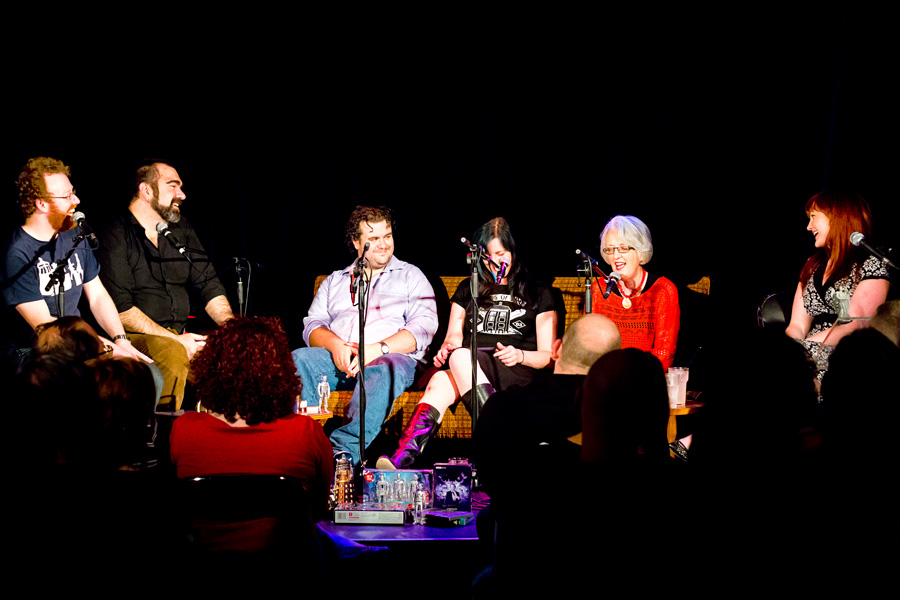Hosts Ben McKenzie, John Richards and Petra Elliott discuss William Hartnell and the notion of “Authority” in the first live Splendid Chaps episode, recorded at the Bella Union in Melbourne on Sunday, January 13, 2013. With special guests Lee Zachariah, Nerida Haycock and designer of the original Cybermen, Alexandra Tynan. Plus musical guest Geraldine Quinn performs her original song “Dr Who’s Assistant” – specially updated from the original 2007 version!
To make sure you don’t miss an episode, subscribe to the podcast in iTunes or via this Feedburner feed.
Podcast: Play in new window | Download (Duration: 1:03:47 — 29.3MB)
Subscribe: RSS


Splendid, chaps! I love Alexandra Tynan!
So do we, Zodin! Thanks for listening.
In regards to the notion of Authority, I was slightly disappointed that no-one mentioned Harriet Jones. Am I the only person who thought everything she did in the Chrismas Invasion was right? Jones is the elected leader of a country and has put effort and foresight into defending the world, yet the Doctor has her literally deposed because he doesn’t agree with her methods (which years later are proved right anyway).
The Doctor feels he has the right to intervene in any way he feels is right, yet punishes others for the same thing. And as Jones correctly points out he often doesn’t show up so why should they rely on him, or even (if we’re honest) allow him to have a say in Earth’s defence? It’s also elegantly put in Gwen’s speech in the last episode of Torchwood: Children Of Earth, and he’s a bit random in choosing his moments. Wouldn’t it have been better if the Doctor had been present at the START of the Dalek Invasion of Earth, rather than the end (not from a narrative perspective, I admit, but you get my point).
To put in another way – why does 9 think it’s right to defeat the Slytheen in Aliens Of London, yet in The Empty Child he feels no need to intervene in a brutal war that will continue for another four years? What moral authority is in play here?
Finally – locking Hitler in a cupboard. Discuss.
Sorry about the essay – loved the podcast!
No apology necessary Sammy – we love the feedback! We only have so much time to discuss the topic – especially this time around, when we wanted to spend time talking to Alexandra!
Your points are all great. I very much agree on the Harriet Jones/Gwen Cooper front: the Doctor is pretty arbitrary. In the early days when he literally showed up at random all was well, but once he became a more traditional hero and knew where he was going it became much more of a problem – like Batman tracking down costumed supervillains rather than human traffickers or corrupt corporate interests.
Doctor Who hand-waves it nowadays by talking about “fixed points in time”, and the Doctor only seems to intervene on Earth when aliens are involved; a sort of loose prime directive style attitude that he shouldn’t interfere with things humans do to themselves. There a exceptions for human colonies on other worlds or in the future, but this is sometimes because the humans are the aliens, upsetting the local order. (A borderline example is The Happiness Patrol, where he intervenes as much for the benefit of the native pipe people as for those oppressed by Helen A.)
We’re considering what to say about Hitler in the cupboard – possibly we’ll cover that when we talk about Evil in episode two!
Thanks so much for listening, and for the great discussion. I hope you’ll stick around!
Hitler In A Cupboard sounds like a song by Morrissey (I know, I know, it’s serious).
I agree that the end of The Christmas Invasion is in some ways worse than the Time Lord Victorious speech, but I can’t decide if the show was intending Harriett’s farewell to be a vindication of her decision or not. Or was it saying she was nobly sacrificing herself – thus “redeeming” herself – while accidentally pointing out she was right all along? It’s interesting that the Doctor being unable to fly the TARDIS properly excuses some of this behaviour – arriving at the end of the Dalek invasion, for example – yet he seems happy to let WW2 play out whenever he’s given a chance to intervene. Perhaps like The Tenth Planet (or in Genesis Of The Daleks), he believes things might be better in the long run if terrible things are allowed to happen in the short?
Great Podcasts, thank you. I’ve been looking for a Dr Who podcast and I’m glad I came upon this one. Growing up in Philadelphia I came upon Dr Who with with Tom Baker and quickly became obsessed. I never really got to see 1 or 2, I think the PBS station started running older Dr Who right around the time I discovered girls. And, my man crush for Matt Smith aside, girls won out. Anyway, I finished episode 1 and came away wanting to see more of the first Doctor.
Can’t wait to start Episode 2 later today. Keep up the awesome work!